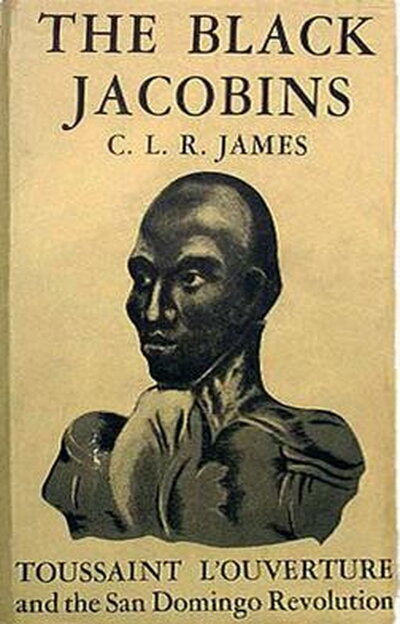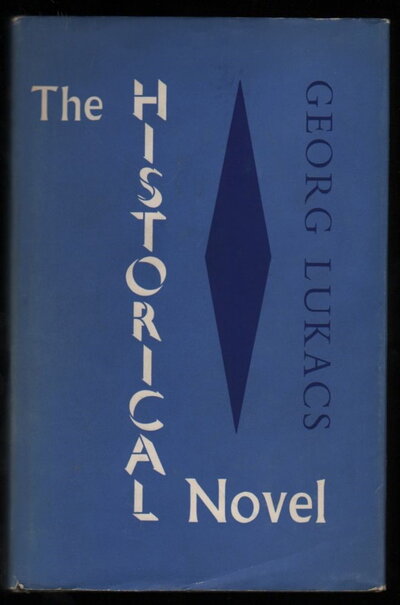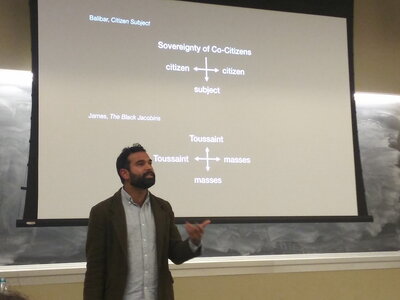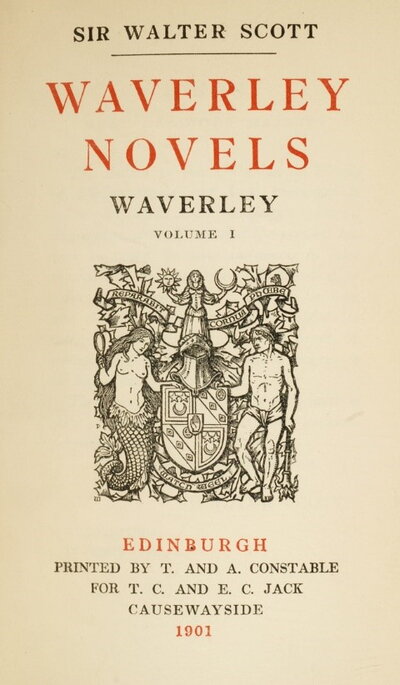[On October 15, 2019 Professor Nasser Mufti (English, UIC) presented a talk on Postcolonial Theory as part of the Modern and Critical Theory Lecture Series. Below is a response by Debayudh Chatterjee (English)]
The French Revolution, Nineteenth Century British Literature, and the Anti-colonial Intellectual: Understanding CLR James's Toussaint L’Ouverture Written by Debayudh Chatterjee (English) Professor Nasser Mufti, author of Civilizing War: Imperial Politics and Poetics of National Rupture and faculty at the University of Illinois at Chicago, began his lecture with a jocund disclaimer. He stated that his engagement with postcolonial studies occurred because of an extended, yet incomplete break-up with Victorian studies. This prescient remark laid the outline for the next one and a half hours. At the heart of his lecture were the ways in which the anti-colonial intellectual negotiated the British literary canon and the zeitgeist of the French revolution.

His case in point was a nuanced reading of CLR James’s seminal work, The Black Jacobins: Toussaint O’uverture and the San Domingo Revolution. By arresting the audience’s attention with his impeccable oratory skills, Mufti invited those that were present to push their limits of knowledge. His dense and provoking presentation, rich with literary allusions and scholarly references, challenged some of the popular axioms of anti-colonial articulation. Right at the onset, Mufti pointed out how postcolonial theory is centered around the figure of the anti-colonial intellectual, as in Frantz Fanon’s Wretched of the Earth. Furthermore, postcolonial theory keeps turning back to nineteenth century fiction. Mentioning theorists like Ranajit Guha and Partha Chatterjee, Mufti unpacked how Victorian literature offered a vantage point in grasping the texts produced by the colonized native. He brought into account Gayatri C Spivak’s reading in Three Women’s Texts that contribute to the “worlding” of the third world; he cited Said’s analysis of Jane Austen to understand how the forces of imperialism affect the production and politics of seemingly innocent texts. However, while endorsing the postcolonial theorist’s skeptical reception of the cannon, Mufti proposed that, on the contrary, the anti-colonial intellectual drew fervid inspiration and critical vigor from the same set of canonical texts.
Rather than deliberating on the Western construction of the Orient, his focused on how the Orient sportingly grapples with the Occident. Borrowing Benedict Anderson’s observation that nationalist consciousness comes into being through the printing press, Mufti drew our attention to the ways in which literary imagination envisioned the postcolonial nation state. The novels written after the French revolution not just capture the changing ethos of the republic, but also underscore the struggle of the protagonist, hailing from a humble background, against a battalion of hierarchical hegemonic forces. It is, therefore, not strange that James, in his autobiography, uninhibitedly conveys his tribute to the Victorian novelist, William Makepeace Thackeray, as an influence more formative than Karl Marx. Thackeray’s magnum opus, Vanity Fair, follows the course of Becky Sharp, a recalcitrant young woman, finding her feet in the capitalist and patriarchal Victorian society. The anti-colonial intellectual draws inspiration from a character such as Sharp to fight his own battles. It is also not unexpected that Toussaint O’uverture, the hero of the Haitian revolution and James’s chief interest in Black Jacobins, is informed by the Romantic sensibilities of freedom, camaraderie, and compassion as perpetuated by the poetic corpus of the likes of PB Shelley and Lord Byron. Toussaint, in James’s revelation, imbibes the ideals of the French revolution more than any French person. The very knell of liberty, equality, and fraternity rings in his mind as a clarion call to redeem his native land, ironically, from the clutches of the French. If literature is an axis of Mufti’s intellectual project, then history definitely forms the other set of coordinates. He went back to Georg Lukacs’s The Classical Form of the Historical Novel to argue how the French Revolution not only affected the life of the republic, but also altered the perception of history itself.

For the first time in the discourse of human civilization, history became a mass experience, the citizen was born in 1789. The impetus of historiographic studies shifted from the chronicles of kings and kingdoms to the lived reality of the common mass under the state apparatus. It was at this moment when Mufti evoked Balibar’s Citizen Subject to contextualize the positionality of Toussaint among his kinsmen. He presented a riveting diagram to illustrate how Toussaint, the well-read hero of the Haitian revolution, was simultaneously a part of, and differentiated from the common masses. Toussaint’s intellectual prowess enables him to access to the modern tools of dissidence brought about by the enlightenment and alienates him from those around him. He occupies a middle ground between the colonizer and the colonized as he speaks in a language that is neither his, nor that of the French revolution. Perhaps, this might be the reason that precludes Toussaint from being inseparable from the masses despite his ardent efforts. The structuralist binary between the anti-colonial intellectual and the colonized masses illuminates much of Mufti’s thoughts on postcolonial theory.

Prof. Mufti’s riveting diagram drawing on Balibar demonstrated the relationship between the intellectual hero Toussaint and the masses. While Georg Lukacs’s observations on the French revolution provided Mufti with the necessary framework to situate CLR James’s study of the Haitian Revolution, the life of Lukacs and his analysis of what he calls the first historical novel, Walter Scott’s Waverly (1814), offered an intriguing foil to unpack the life of James and his hero, Toussaint.

As Mufti pointed out, Lukacs and James shared a number of similarities: they belonged to the same chronological period, their notable works were published and reread in the same decades, they had mutual admirations for Leon Trotsky and John Lennon, and were equally fascinated by the French Revolution. However, Scott’s treatment of Edward Waverley, an army man at the backdrop of the Jacobite uprising of 1745, differs drastically from James’s interpretation of Toussaint. Like the X and Y axes of a graph, they move towards different directions albeit sharing the same starting point. At par with the diverse range of binaries—history and literature, the citizen and the sovereign, the intellectual and the masses—that scaffolded Mufti’s theoretical venture, it would be appropriate to keep in mind another dialectic that assists us to distinguish a figure such as Fanon or James from their intellectual successors: anti-colonial ‘romance’ and post-colonial ‘tragedy’. Citing David Scott’s Conscripts of Modernity: The Tragedy of Colonial Enlightenment, Mufti remarked how the anti-colonial campaign of liberation was more of a romance—high on dreams, basking in the rays of European enlightenment—while the lived post-colonial realities of the same nations were tragedies. The 1955 Bandung conference, which Mufti identified as the beginning of the end, was perhaps the last page of the romance. The sequel, owing to a gamut of factors marking the failure of the post-colonial nation state, is nothing short of a tragedy.
The modernist clamors of liberty, equality, and fraternity were soon to be lost in the resurrection of totalitarian regimes, neocolonial agendas, identity conflicts, and religious extremism. The conspicuous rise of the right-wing populist governments across the globe stands as a glaring testimonial. The final section of Mufti’s lecture was concerned with the inquiry if Toussaint had a literary counterpart. He briefly analyzed three novels—Elizabeth Gaskell’s North and South, W.E.B. Du Bois’s Dark Princess, and V.S Naipaul’s The Mimic Men—to conclude that while Margaret Hale, Matthew Townes, and Ralph Singh, respectively the leading protagonists, partially shared Toussaint’s trajectory, their predicaments were entirely different on the grounds of political context and individual psyche. But does a character as unique as Toussaint need a literary counterpart at all? The racy narrative of CLR James’s Black Jacobin progresses like a novel in itself; Toussaint stands out, in retrospect, as a larger-than-life figure with all his contradictions, affecting and being affected by history. We must unequivocally express our scholarly gratitude to Prof. Nasser Mufti for generously throwing light on the complex, murky cobwebs that connect the colonizer with the colonized.